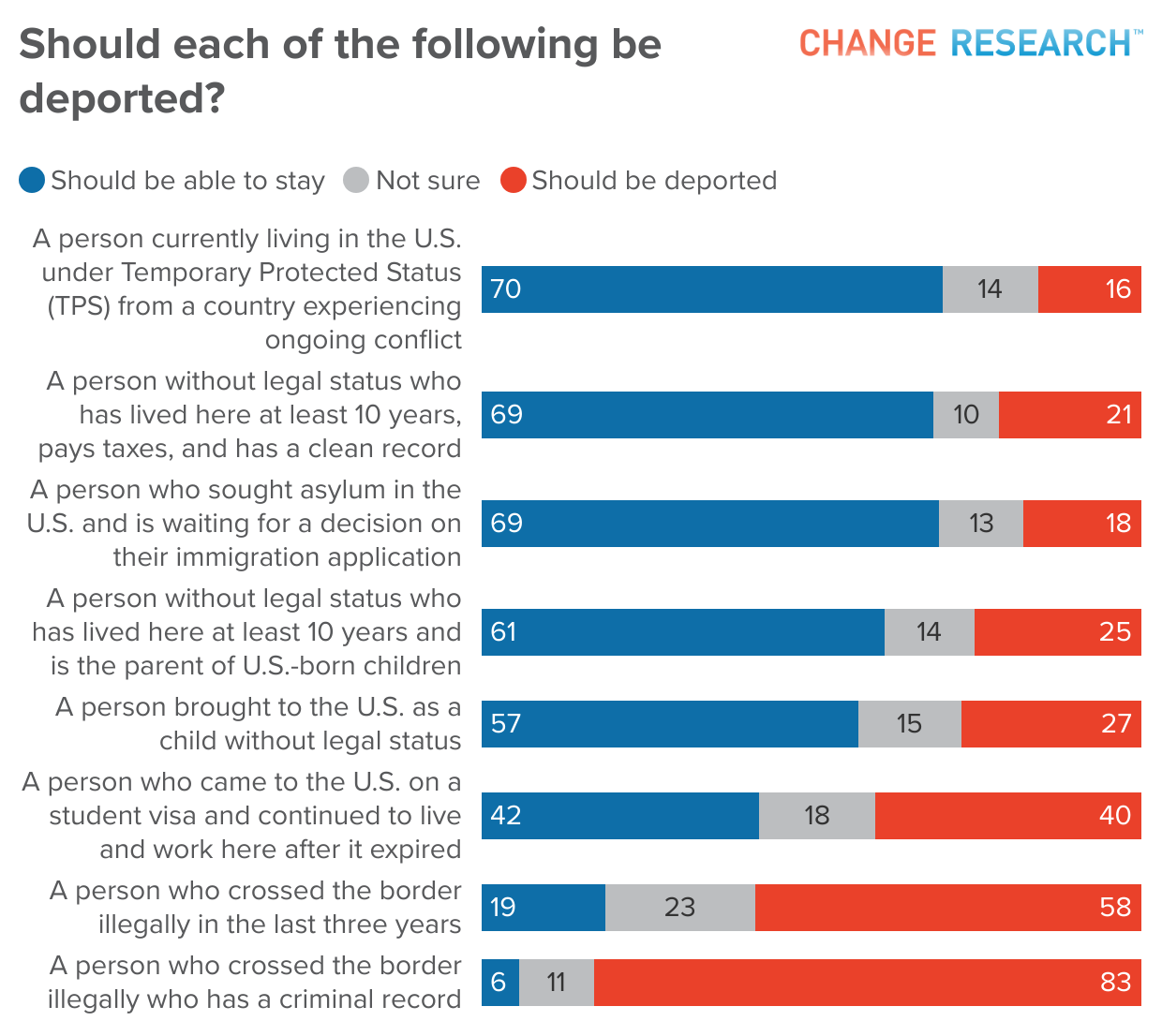
Change Research Lead Analyst Ben Greenfield recently noted that while mass deportations are popular as a general concept, support for specific aspects of implementation is significantly lower. Our latest national poll corroborates and extends those findings.
Mass-deporting immigrants only polls well in the abstract.
Several public polls have reported fairly strong support for mass deportations in the last several months. A Scripps News-Ipsos poll from September 2024 reported that 54% of Americans support “mass deportation of undocumented immigrants” (our polling results are similar). A January 2025 poll from Axios found that 66% of Americans support “deporting immigrants who are in the country illegally.” These abstract questions have been widely reported and have fed a narrative that Trump’s immigration agenda is popular. But in our most recent poll, we dug below the surface to understand what voters think this means and who it will help or harm, and we found a more nuanced story.
The majority of voters don’t believe Trump’s claim that mass deportations will primarily target criminals. President Trump has claimed that his plans will affect people with criminal records who engage in nefarious, illegal activity. According to our most recent national poll, the majority of registered voters–across party lines–do not believe that’s what’s actually going to happen. The plurality of voters (47%), including half of Republicans (50%) believe his mass deportations will equally impact undocumented people with clean records who contribute positively to their community and undocumented people who are drug traffickers or have criminal records.
A plurality of voters think mass deportations will weaken, not strengthen, our economy. Forty-eight percent of registered voters think that mass deportations will make our economies and industries weaker, including an overwhelming majority of Democrats (85%) and half of Independents (50%). Only 31% of voters nationwide believe mass deportations will make our economy and industries stronger. Republicans are the only group who believe mass deportations will impact our economy positively (60%); 40% of Republican voters think mass deportations will weaken our economy, aren’t sure what to believe, or expect they will have no economic impact. In other words, even among those most likely to support President Trump, 40% don’t buy into the president’s claims that mass deportations will boost the American economy.
The majority of voters believe that immigrants from a variety of backgrounds and circumstances should be allowed to stay in the country.
Some of these hypothetical scenarios we tested are coming to fruition before our eyes, even as a majority of voters think people from those groups should be allowed to stay in the country. The Department of Homeland Security recently cancelled the Temporary Protected Status given to thousands of people from Venezuela who came to the United States in recent years. Seventy percent of American voters oppose deporting people with TPS. Last week, a coalition of 18 attorneys general argued that early terminating protected status would cause irreparable harm.
President Trump also issued an Executive Order attempting to end birthright citizenship, which was blocked and recently upheld by a third appellate court. Denying citizenship to children in the U.S. born to undocumented parents is unpopular. Fifty-seven percent of registered voters oppose ending birthright citizenship – and 61% also favor allowing undocumented parents to U.S.-born children who have lived in the U.S. at least 10 years to stay in the country.
The only categories we tested that garner majority support for deportation are people who crossed the border illegally within the last three years (58% say they should be deported) and people who crossed the border illegally and have criminal records (83% say they should be deported). However, most of the American public doesn’t believe this is the group that will be chiefly affected by deportations. The majority of voters do not want to see most law-abiding, taxpaying people deported.
Thanks for reading TouchGrass! Subscribe for free to receive fresh data regularly.
Lauren Goldstein, Lead Analyst, Advocacy
Lauren holds a PhD from UCLA and has ten years of experience as a public opinion researcher and social scientist. She has done extensive research and polling on issues related to immigration, racial justice (and injustice), criminal legal reform and police divestment, and reproductive rights.
Join us Friday, March 14th (9 AM PT/12 PM ET) for data-driven analysis of President Trump's second term, based on our February survey of 2,732 voters.
Key findings show the administration faces challenges on economic issues while maintaining strong support on immigration. Our briefing will cover:
Voter perceptions across demographic groups
Strategic messaging opportunities
Trends shaping the 2026/2028 political landscape
Exclusive Preview:
51% disapprove of Trump's performance
67% believe income isn't keeping pace with costs
52% stress over grocery prices
In a hypothetical scenario without the 22nd Amendment, Obama (49%) leads Trump (42%)
Attendees receive bonus analysis on Project 2025 and Ukraine.








